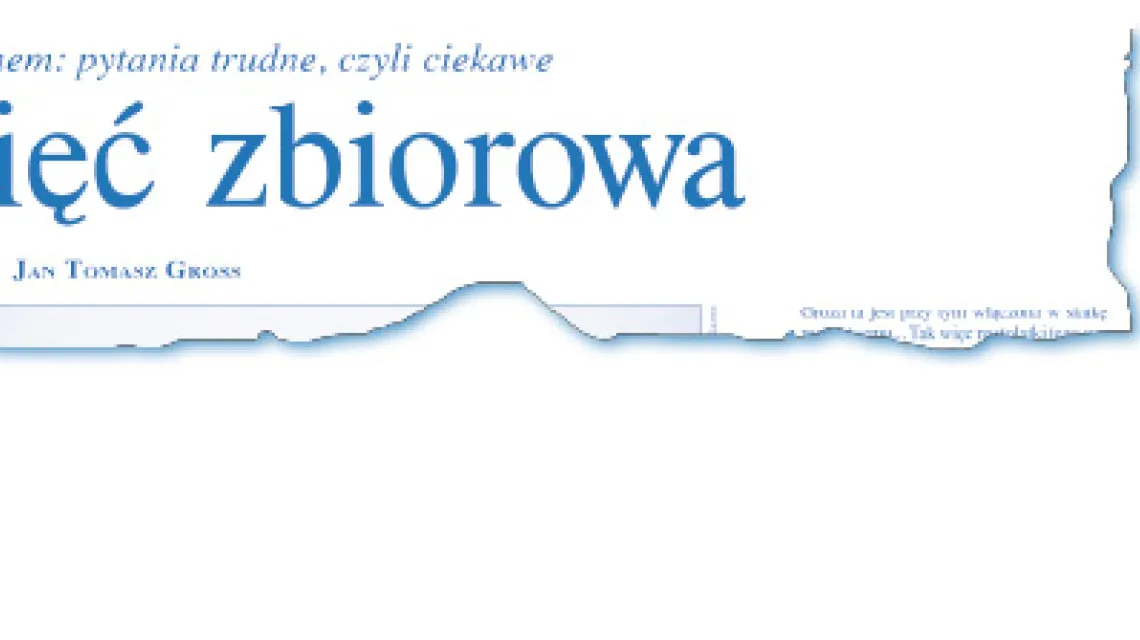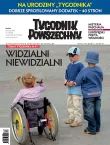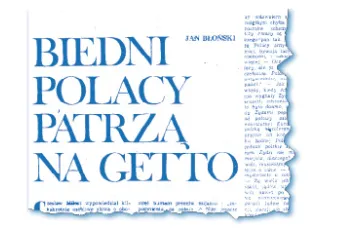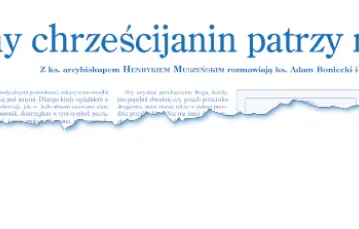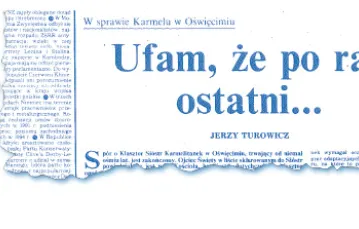Wykupienie dostępu pozwoli Ci czytać artykuły wysokiej jakości i wspierać niezależne dziennikarstwo w wymagających dla wydawców czasach. Rośnij z nami! Pełna oferta →
Jan Tomasz Gross’s text appeared in Tygodnik Powszechny No. 32/04, opening a debate which also included contributions from Paweł Machcewicz and Rafał Wnuk (“The horrible nature of the crimes committed in Jedwabne and Radziłów makes them exceptional primarily from our point of view, since we live in relative stability and peace"), Jerzy Jedlicki (“It was simply that not one of those who knew wanted to introduce their private knowledge into the public domain; it was better to forget"), Hanna Świda-Ziemba, Władysław Bartoszewski, Jan Woleński, Marcin Kula, Dawid Warszawski, and Wojciech Lizak; the themes present in “Collective Oblivion" were developed a few years later in Fear. In 2006, Tygodnik Powszechny published an article by Gross on the Kielce pogrom (“I wish to explain that the blood on my clothes..."); in that text, Gross also used the materials included in his book on post-war anti-Semitism. The debate was re-ignited after the publication of Fear (reviewed in Tygodnik Powszechny by Paweł Machcewicz and Jerzy Jedlicki). “Poles started the painful examination of their attitudes towards the Jews a few years ago owing to Gross’s previous book, which the author himself seems not to appreciate", Paweł Machcewicz wrote in his article “Shades of Black" (Tygodnik Powszechny No. 2/08).
From the moment I started working on Neighbours, I asked myself how it was possible that the Jedwabne crime had not been recorded by historians of the Nazi occupation. Well, I myself needed a few years to accept Szmul Wasersztejn’s account. But how can one explain similar ignorance on the part of several generations of historians who were, after all, immensely knowledgeable about the wartime period? The problem here is not that someone was initially unable to decipher a document they got hold of or that they tried to withhold their knowledge of some event. Errors and fraud may be regrettable, but they do not constitute a puzzle for historians.
We Know But Will Not Say
In the case of the murder of the Jedwabne Jews, however, we encounter an extremely interesting puzzle. Is it not amazing that the crime was common knowledge (people in the town and its vicinity knew of everything), was publicised (the course of events was made clear at the trial in Łomża), recorded in writing (the events were described in a book commemorating the Jews of Jedwabne, published in 1980; Szymon Datner clearly alluded to them in his 1969 article as well), and at the same time was absent from the historiography of the period? Yet, this was not a minor, marginal, insignificant event - the debate that ensued in Poland is the best proof of that.
How can we look at something and yet not see it? How can we know something and be unaware of this knowledge at the same time? These are the questions that need to be answered - and not just in terms of the psychology of individual perception. Since the publication of two volumes entitled Wokół Jedwabnego [Around Jedwabne] (Warsaw 2002) - the result of almost two years of research by historians and lawyers affiliated with the Institute of National Remembrance - these questions strike us as particularly pertinent.
It turns out that, in the summer of 1941, the inhabitants of at least two dozen towns in the Białystok area murdered their Jewish fellow citizens (Paweł Machcewicz, Wokół Jedwabnego, p. 22). Those crimes - and we are talking about mass murder here - took place in several districts and spanned many weeks. It was not just one or two or three towns situated close to one another that were convulsed by violence for a single day (we knew from the outset that local people had murdered their Jewish neighbours in Wąsosz, Radziłów, and Jedwabne), but rather a wave of criminal acts that left, in fact, no trace in Polish history textbooks or specialist historical studies. How was this possible? Were those crimes not recorded anywhere - except, of course, in the collective memory of several hundred (?) thousand people who lived in the Podlasie and Białystok area? In this case, if events that were hardly unremarkable and were witnessed by tens of thousands of people have not become part of our knowledge of the period, what does this mean?
Volume two of Wokół Jedwabnego - a collection of documents on the themes examined here - tells us what was known (as well as to whom and when) about the behaviour of Poles in the summer of 1941 in the Białystok area. In Part III includes almost 30 pages of “Documents of the Polish Underground State on the situation in the Białystok area after 22 June 1941" (pp. 123-154). Most of the texts were authored by the staff of the Bureau of Information and Propaganda of the Headquarters of the Union of Armed Struggle (later the Home Army), i.e., people who were trustworthy on account of their organisational affiliations and posts held. A few survived the occupation and were hardly anonymous figures. Aleksander Gieysztor, who co-edited the Bureau’s wartime news bulletin, was a medieval historian of international repute and, for a time, was Head of the Polish Academy of Sciences. Antoni Szymanowski, another editor, was a distinguished Polish diplomat after the war. Finally, Professor Stanisław Płoski, who headed the Home Army’s Military Bureau of History, was an outstanding modern historian.
Thus, the documents collected in Wokół Jedwabnego were not only compiled by the most important institutions of the Polish Underground State, but were also authored by outstanding figures who were in no way tainted by anti-Semitism (in Underground circles, Jan Rzepecki and his colleagues from the Bureau of Information and Propaganda were considered left-leaning democrats). Some of the documents quoted were signed by the Home Army’s Commander-in-Chief, Stefan Grot-Rowecki, or by Home Army inspectors.
A telegram sent by Rowecki at the beginning of July 1941, “First news from captured areas indicates that occupying forces are perceived as liberators from the Bolshevik oppression in which the Jews played a great part. In Brześć, a Jewish pogrom by Poles who were released from prison" (p. 130). July 1941, Military Bureau of History, “Annex on Terror": “Regrettably, in several cities (Brześć-on-the-Bug, Łomża, Białystok, Grodno), the local Polish population, together with German soldiers, perpetrated pogroms or even mass slaughter of Jews" (p. 132). September 1941, a dispatch from a Union of Armed Struggle officer, “The Poles in the area consider the Germans to be their saviours; German troops have been welcomed almost enthusiastically everywhere - with flowers and sometimes triumphal gates; locals have offered their cooperation. This concerns everyone, irrespective of their social status. The Germans are quick to avail themselves of these services... Polish hostility towards the Jews is so great that the locals do not imagine that a normal attitude towards Jews could be possible in the future" (p. 138). September 1941, a dispatch from the Union of Armed Struggle intelligence network, “...in smaller towns, only the Hilfspolizei are present, consisting of former Polish policemen and local Poles and Belarusians... In municipal councils, Poles are in the majority" (p. 139). October 1941, “Annex on Terror", “The arrival of German troops has resulted in terror against the Jews on a monstrous scale - these acts are perpetrated by the army with significant help from the local populace" (p. 143). A report on the situation by the [Polish Government-in-Exile’s] Government Delegation for Poland, 15 August-15 November 1941, “Early into the occupation, skilful German propaganda managed to garner support. The recurring motif was that the Germans had arrived to liberate the country from Bolsheviks and Jews, which was easy to believe when the idea of Jewish pogroms was suggested; these were organised on a large scale in the Szczuczyn, Łomża, Augustów, and Białystok districts... Currently, almost all administrative posts except for the top ones, which are staffed by Germans, have been handed over to Poles... some youths with Fascist views and even several former members of pro-independence organisations have entered German service and formed militia units" (p. 147). November 1941, “Annex on Terror", “Pogroms involving the local populace are being provoked" (p. 148).
The Call of Decency
So, it was not just the local population that knew of the Jewish pogroms perpetrated by fellow citizens. As the documents quoted here demonstrate, the central authorities of the Polish Underground were kept informed of developments as well. The cited accounts - and this is probably a fairly complete set of Underground documents on the subject (in the “Annex on Terror" of June 1941, it is stated that more precise information would be provided “the next time," but a footnote by the editors explains that no other Union of Armed Struggle reports on Polish participation in anti-Jewish activities were found) - show that the phenomenon aroused no special interest. Nothing indicates that additional documentation including detailed reports and in-depth studies was requested.
Why was that? Ultimately, one of the principal objectives the Polish Underground State set itself (irrespective of the ideological diversity of its member organisations) was to look after intangible values, protect the substance of the nation from disintegrating, counteract the collective demoralisation that could result from obeying the occupier’s regulations, cultivate honour, human dignity, common decency, civic virtues, and patriotism - whilst the occupiers wanted to undermine each and all of these values. How, then, could a situation be disregarded in which a group of citizens, instigated by the Nazi invaders, murdered another group of citizens? After all, crimes against Jews were committed in collaboration with the Nazis (this subject has not aroused historians’ interest so far, either).
Can one imagine any other kind of collective action that would be as damaging to the Polish Underground’s objectives? Did corruption, the decay of civic virtue, or indeed the dehumanisation of entire sections of the Polish population become so evident at any other point during the occupation? Why did this violation of the imperative to resist being manipulated by the occupying forces against fellow citizens (and this was its worst possible variant: people let themselves become accomplices to murder) not lead to panic, horror, and an urge to counteract such crimes? Why did not those nice, wise, and decent people - I mean here the Bureau of Information and Propaganda staff mentioned earlier, whom I knew because they used to visit my parents’ flat after the war (my mother was a Bureau courier; her first husband, Stanisław Wertheim, who was executed by firing squad during the occupation used to co-edit the news bulletin together with Gieysztor and Szymanowski) - raise an almighty uproar and tear their hair out upon hearing of those heinous crimes? This was, after all, a catastrophe that the Underground press and the authorities should have reacted to immediately.
It seems that it was only Jan Karski who understood from the outset the danger posed by anti-Semitism “among the wider masses of Polish society." “As regards their attitude towards Jews," Karski wrote in a report delivered to Prime Minister Sikorski in Angers in the winter of 1940, “it is ruthless, merciless even. They use to a large extent the powers that the new authorities have given them. Not only do they use these powers often, but they abuse them as well. This brings them somewhat closer to the Germans... The ‘resolution of the Jewish problem’ by the Germans - and I say this with full responsibility - is a major and quite dangerous tool that they use to ‘morally pacify’ broad segments of Polish society... this matter constitutes a sort of a narrow footbridge on which the Germans and a significant part of Polish society meet in agreement, however... this threatens the corruption of broad segments of society, and this corruption may cause huge problems for the future authorities of the Polish State, whose rebuilding will be a difficult undertaking."
Concluding that part of the report, Karski wrote, “Remaining passive in the face of the current state of affairs threatens the corruption of Polish society (mostly its lower strata) and poses all the dangers resulting from this - albeit partial, but in many cases genuine - ‘consensus’ between a significant proportion of Poles and the German invaders" (Mówią Wieki monthly, November 1992, pp. 3-8). Unfortunately, as we now know, although Karski was right, no one listened to him. In fact, even at that time he was told to remove this and a few other passages from the report, lest the Allies learn of the anti-Semitic sentiment prevailing in occupied Poland.
Kitchen Stairs
If neither the Underground authorities’ ignorance nor their ill will can explain why the mass murder of Jews by their Polish neighbours was disregarded, how should we interpret this “oversight"? How do we explain the refusal to accept the fact that those monstrous events (there is no other word to describe them) took place?
After alternative hypotheses (that nothing was known of those crimes and that people deliberately concealed their knowledge of them) have been eliminated, we reach a point where we have to venture into the unknown. My intuition tells me that the reason for this selective blindness is to be found in the hierarchical, post-feudal structure of Polish society.
Stanisław Mikołajczyk once said that his colleagues from the government-in-exile had never forgiven him for being a peasant. The distance between the classes and disdain for those lower down the social ladder in pre-war Poland was not just the stuff of Gombrowicz’s novels - it was reality. Following this lead, we might imagine that the slaughter of Jews by peasants and small-town inhabitants, which took place amongst the “riff-raff," went unnoticed by the landowners, civil servants and intelligentsia higher up the social scale who first organised the Underground and then proceeded to write history. Those were the “kitchen stairs," while the national drama, the war as portrayed in patriotic myths, was taking place on the centre stage.
A country stripped of independence by its neighbouring states, the invaders’ efforts to exterminate its elites, heroic resistance culminating in an uprising that could never succeed, the gesture of sacrificing the best sons and daughters in an uneven fight, and defending values in the face of pragmatism that called for compromise - this was the reality of Poland’s wartime experience, the final scene in a romantic mystery play. It was easy for the protagonists to succumb to the illusion that the “riff-raff" had no role to play in this drama. From time to time, someone took note of their fate, although it was of no great importance. Where honour, intangible values, raison d’état and the homeland were concerned, “Louts and Jews" had nothing to contribute.
When deliberating on this matter, I was unexpectedly assisted by a book by the excellent Professor Hanna Świda-Ziemba. In 2003, Wydawnictwo Literackie published her Urwany lot [Unfinished Flight] - a study of “the young post-war intelligentsia in light of letters and diaries from the years 1945-1948." Professor Świda-Ziemba graduated from secondary school in Łódź in 1948; in the book, she offers us a collective (auto)biography of her generation. The book is full of quotes from the 91 “complete personal documents" the author managed to get hold of, including diaries, collections of letters and, finally, sources that are, I think, unique in the history of memoir writing, namely, notes exchanged between students during lessons (“I have seven such notebooks from various cities," Professor Świda-Ziemba writes on page 17).
“Unfinished Flight" presents the state of mind of Poland’s young intelligentsia immediately after the war. When the war broke out, they were around ten years old; under the occupation, they attended clandestine classes. They were from intelligentsia families - the younger brothers and sisters of the Underground scouts’ generation (the “Grey Ranks") described in Kamienie na szaniec [Stones for the Rampart].
“The war does not obstruct the continued passing down of the pre-war worldview and its associated meanings to children (and then to teenagers) in their family homes, within circles of friends, in churches, in clandestine classes, in guerrilla units, in Underground newspapers, in daily contacts between people" - this is how Professor Świda-Ziemba explains the manner in which her peers’ generation was socialised. “Moreover, this worldview is transmitted and consolidated in a particularly emotional setting... For children and teenagers, everything that existed as an idea, a literary image, or as the future path of ‘adult life’ before the war, now takes on a realistic - and horrible - aspect. This horror exists within a romantic framework... Thus, both the consciousness and actions of teenagers of this generation are immersed in the mystique of ‘Polish sacrifice’ that will eventually lead to victory..." (p. 58). The author explains that her generation was “the last in a row" to preserve the continuity of traditional values. “When I was young," she writes, “I had the impression that my outlook on life was much more similar to that of my parents than to that of my pupils and my sister, who was nearly 9 years my junior" (p. 7).
In Professor Świda-Ziemba’s book, I searched for information on how the “the last in a row" generation of the Polish intelligentsia had recorded the catastrophe of Polish Jewry, and I found a short paragraph stating that the war had made young people indifferent “even to the most traumatic experiences of ‘others’ outside their own community" and that “there was no serious reflection on the Holocaust" in the materials the author had studied (pp. 56-57). The author writes that the Holocaust “never became a matter for reflection... the Jewish problem was seen as if the world had returned to the pre-war era and the Holocaust had never happened... Anti-Semites repeated their pre-war accusations... the Holocaust itself was not present in those discussions as a shock or an important argument... Why did awareness and experience of the Holocaust not prevent young people from voicing anti-Semitic views and why did their opponents not use this as an argument?... I can record this now as an astonishing fact which I cannot fully understand but which was real nevertheless" (pp. 92-94).
Of course, hardly anyone in Europe discussed the Holocaust after the war and the Jews were “outside one’s community." Another reason was that “the young intelligentsia quickly learned that they lived in a hierarchical society... At the top of the hierarchy were ‘well brought-up’ people, i.e., the intelligentsia" (p. 42).
What was the ideal of a Polish inteligent that was instilled in young people? “A ‘well brought-up’ person," Professor Świda-Ziemba writes, “was above all well-mannered... educated... with certain personality traits that demonstrated he was not a ‘lout’... We were also taught that the intelligentsia had a mission to safeguard the highest values... If the concepts of Poland, God, and Christ were mostly discussed in abstract terms... the model of a ‘well brought-up’ person was instilled in children on a daily basis through various, usually laconic remarks. A few examples: ‘don’t behave like a lout’, ‘this is not appropriate company for you,’ ‘remember that you come from a good home.’ The ‘non-intelligentsia’ world was perceived in other terms. The term in question here was ‘common people.’ ‘Common people’ included everyone who was not ‘well brought-up.’ Common people were poor, rich, or landless peasants; skilled and unskilled workers; the illiterate; the lumpenproletariat; and also artisans and merchants who were uneducated (or unfamiliar with the manners and values of the intelligentsia). In other words, according to the worldview that was passed down, Polish society was divided into the intelligentsia and the common people... Common people were unenlightened and ignorant (this also concerned their national affiliation). Therefore, common people deserved some respect but, at the same time, their very existence presented a challenge to the intelligentsia. As far as possible, they were to be assisted, but mostly they need to be taught. Common people were like untilled soil that had to be worked. Being a member of the intelligentsia - the higher class, much wiser and well-mannered - carried with it an obligation. This obligation involved charity, but above all it implied ‘educating the common people’ and raising their awareness - in hygienic, educational, and patriotic terms" (pp. 43-45).
One suspects that in the opinion of ‘well brought-up’ people, the Jews left as much to be desired in hygienic, educational, and patriotic terms as common people. The reason why we were unaware of “common people" committing crimes against the Jews was probably that brawling amongst “the rabble" was not particularly interesting to those who kept “better company." No one lied about it or concealed anything on purpose - there was no point. Let us hope that this attitude has changed and today’s society will demand that historians look at its past with a view to recapturing the kind of knowledge that assumes all people to be equal.

